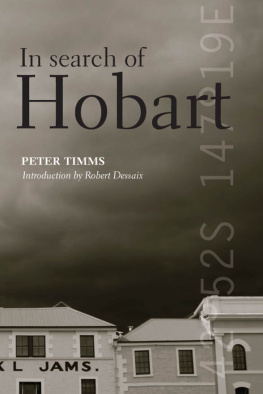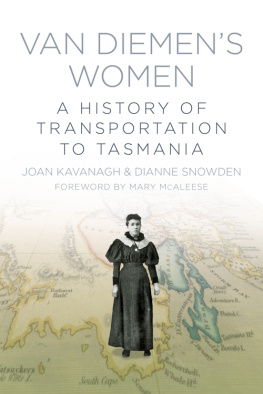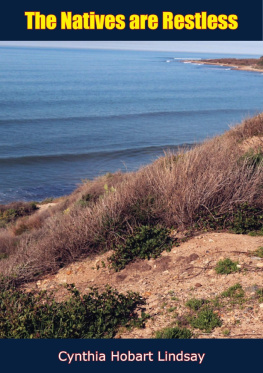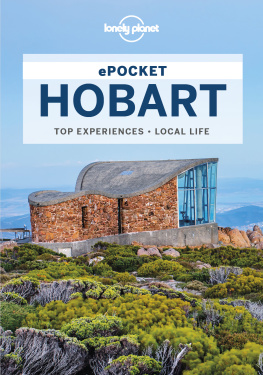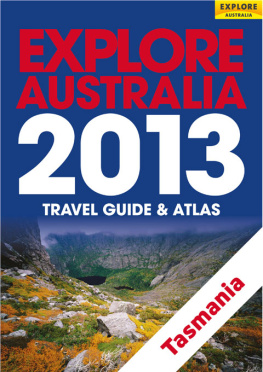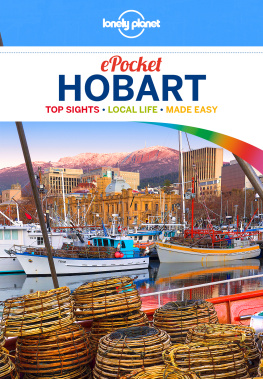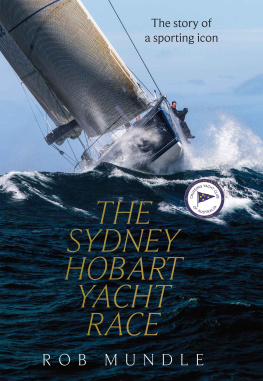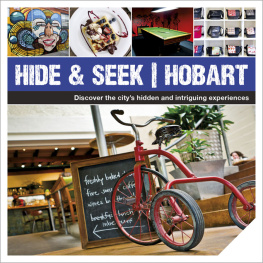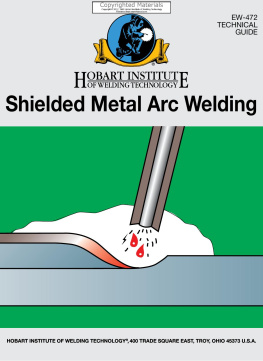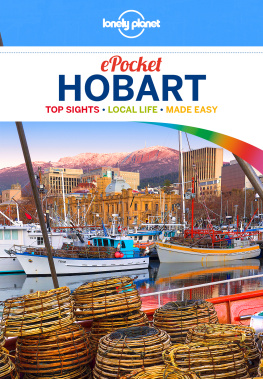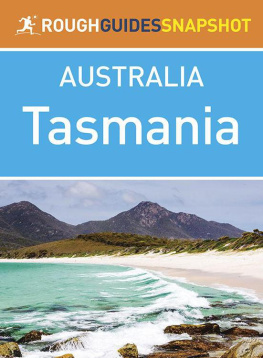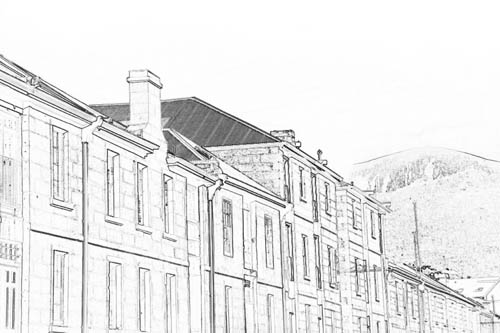This book is copyright. Apart from any fair dealing for the purpose of private study, research, criticism or review, as permitted under the Copyright Act, no part may be reproduced by any process without written permission. Inquiries should be addressed to the publisher.
Author: Timms, Peter, 1948 Title: In search of Hobart / Peter Timms.
Subjects: Hobart (Tas.) Guidebooks. Hobart (Tas.) Description and travel. Dewey Number: 919.461
Foreword
Too far south for spices, Abel Tasman wrote dismissively in 1642 on sighting the island now bearing his name, and too close to the rim of the earth to be inhabited by anything but freaks and monsters. Wrong on both counts, as it happened, he sailed on rather grandly into the Pacific looking for somewhere more worth discovering. No other European bothered to put in an appearance for almost a century and a half.
All the same, as Peter Timms illustrates with abundant examples from letters, memoirs, fiction and press reports, Tasman managed to put his Dutch finger on several matters of concern to both visitors and inhabitants throughout the two centuries of European settlement. To this day many Tasmanians are uncomfortably aware of being too far south for spices that is to say, of no earthly use to anybody. The British, as we know, found a use for Tasmania as a dumping-ground for its excess prison population, but that wasnt the kind of productive use that Tasman had had in mind. With pathetic eagerness to be profitable, Tasmania has shown itself willing to chop itself down and pulp itself, if thats what it takes to be of use mainly to the Japanese, as it happens. Tasmania doesnt want to be merely beautiful. In fact, Tasmania is ready to disfigure itself in ways that will never heal, as anyone who has ventured beyond Hobart and its environs knows, if thats what it takes to prove its usefulness. Beauty is actually worth as much as or more than spices, but it takes a certain kind of maturity to understand why: richness is not the same as wealth.
At the heart of several of the pieces in the mosaic of this book, and hardly absent from any, is an echo of Tasmans second barb as well: too close to the rim of the earth to be inhabited by anything but freaks and monsters. As the historian Lyndall Ryan has pointed out, Tasman probably had the fantasies of the Carthaginian navigator Hanno in mind when he wrote that in 1642 poetry and knowledge were not quite so clearly marked off from each other as they are today but, again, he hit on an anxiety that peppers conversations and simmers away unresolved in the minds of both inhabitants and visitors right up to the present: is Hobart too small and too far away from civilisation (Melbourne, New York, Paris wherever you think civilisation resides) to make a civilised life possible? Its a question that people living far from their cultures metropolis have to confront all over the world, from the wastes of Siberia to provincial France, from small-town Canada to the islands of the Pacific. As we find time and again in these pages, in Hobart as everywhere else, they answer their own question with a mixture of aggressive pride in their special situation and a longing to be somewhere else somewhere that matters. They half suspect that only freaks and monsters could indeed live in their remote fastness (that in itself being a thrilling prospect for some), and half believe that they of all mankind have found paradise. It can be dizzying.

Although Abel Tasman gets a mention or two in this book, along with convicts, the odd colonial governor and some of the more colourful sides to life in Hobart in the early years, this is not a history. Given the abundance of histories of Tasmania, Peter Timms has come up with something no less useful but quite singular: a concatenation of views of Hobart. From the opinions of famous foreigners to modern-day tourists (sometimes scathing), from letters and diary entries to interviews he conducted himself with Hobart identities, he has written what is in effect a many-voiced conversation about Hobart today.
Although Peters own voice intrudes only spor-adically, its clear, I think, that the book has grown out of a deep, although by no means uncritical, attachment to the city of Hobart. Yet, when he and I moved here from Melbourne seven or eight years ago, we did so on the spur of the moment. Wed been edging closer to the rim of the earth from our starting point in Sydneys Paddington for what seemed like decades, always looking for somewhere we could have a good life without being wealthy. Eventually our gaze turned on Hobart not in desperation, I hasten to add, although we were certainly aware it was a gamble. So we came, we saw, we bought. And suddenly, within weeks, we were living here.
Its worth emphasising that it was a move to Hobart rather than to Tasmania. There are tranquil beauty spots we could have settled in all over the country, but nowhere else that combined all the capital city amenities we craved with the pleasures of a more leisurely way of life close to nature. In other words, as Peter hints towards the end of the book, after seesawing for 200 years between forlorn, even sinister, backwater and go-ahead provincial capital, by the time we got here Hobart seemed poised to get the balance more or less right.
Remembering the old clichs about Hobart, or perhaps a school trip there in the 1960s, most people thought we were mad. A literary columnist in one of the mainland dailies, giving his readers the astonishing news that we had decamped from Melbourne, asked with a sneer if it was something theyd said. A friend in Amsterdam wrote advising us to make sure there was a hospital in Tasmania. What will you do there? many asked, as if, detached from the life-support systems of Melbourne, we risked drifting off into unconsciousness, never to awake. Civilisation, they were convinced, was something you had to suffer to enjoy. After all these years, I still run into acquaintances on the mainland, especially in Sydney, who ask, completely unaware of what theyre implying: And are you still in Hobart? Yes, I say. Are you still in Sydney?
The reasons any of us feel that this place rather than that place is home have their roots deep in our own experience over a lifetime. Many years ago, for instance, in the first book I ever wrote, I described in some detail a city in a parallel world I have retreated into several times a day since early childhood. Squashed between mountains and water, on the banks of a river, on an island facing south, it has all the contours of something fundamental to who I am. Not until we had actually started living in Hobart, though, not quite knowing why we were here, did it strike me that those pages in my first book, A Mothers Disgrace , described with almost uncanny accuracy the city outside my window.

